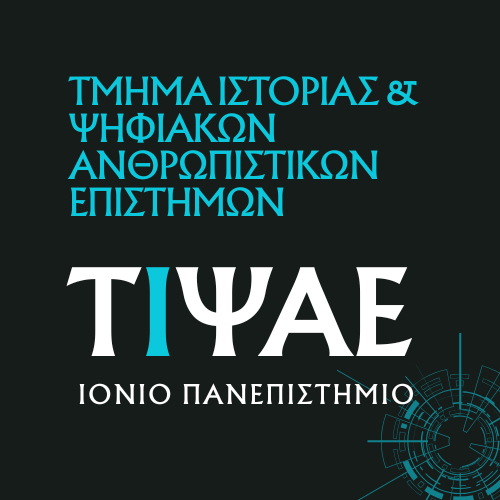HISTORY AND IMAGINATION: UTOPIAN AND APOCALYPTIC THOUGHT IN MODERN TIMES
Teaching Staff: Kokkomelis Nikos
Course Code: ΙΣΤ207
Course Type: Compulsory Elective
Course Level: Undergraduate
Course Language: Greek
Delivery method: Lectures
Semester: 6th
ECTS: 5
Teaching Hours: 3
E Class Page: https://opencourses.ionio.gr/courses/DHI409/
Curricula: Curriculum in History up to 2024-25, Curriculum in History and Digital Humanities from 2025
The aim of the course is to familiarize students with the concept of historical imagination. The central focus of the course will be the study of conceptions of historical time in modern times and the reasons why historians and thinkers have resorted to utopian thinking to describe the hopes or fears of societies in the face of political reality, social change, and technological progress. Both in Thomas More's Macrocosmic Treatise (1516) and Francis Bacon's New Atlantis (1627) and in the dystopias of George Orwell and Aldous Huxley, the central theme was humanity's dream of happiness. But what were the intellectual conditions of this aspiration?
Starting from the 15th century and traversing some of the most important moments of reflection on history, the teaching will be devoted primarily to commenting on ths attempts to conceive and represent the immediate or distant future. In this context, the concept of the Apocalypse will be examined as a synonym for total destruction and fear in the face of the possible interruption of historical time. From the eschatological motivations of Oliver Cromwell's New Standard Army to the Apocalypse documentary series on World War II to literature's reification of the events of 9/11, the course will focus on the study of Apocalypse and Utopia as historical analytical categories.
By the end of the semester students will be able to understand the historical content of the terms "Utopia" and "Apocalypse". Particular attention will be given to the issue of the superimposed temporalities upon which they are constituted as well as the connection between eschatological reflection and specific cultural markers of historicity. The description and periodisation of the successive transformations of utopian thought will allow students to understand the content of the term 'historical imagination' and to delve into specific issues such as the European voyages of discovery, the economic and social changes brought about by the industrialisation of the 18th century and, among others, the birth of the first socialist visions. In the perspective of the course offering as full a picture as possible of the contemporaneity of historical practice, particular reference will be made to the concepts of dystopia and trauma as well as to contemporary manifestations of the utopian in architecture and art.
1st Lecture: Introduction
Lecture 2: The Book of Daniel and the Apocalypse of John. The story as prophecy.
Lecture 3: From Apocalypse to modernity. From paradise on earth to the new world
Lecture 4: Ancient "utopias". From Plato to St. Augustine
Lecture 5: The birth of the modern utopia: Thomas More, Francis Bacon, Henri Neville
Lecture 6: Protestant visions: from war to heaven.
7th Lecture: Enlightenment Visions. The Year 2440
Lecture 8: Technology and progress: the industrial utopias
9th Lecture: The New Socialist World
Lecture 10: The wondrous new world: Utopia - Eutopia - Dystopia
Lecture 11: Apocalypse as trauma: war and metonymies of destruction
Lecture 12: Modern Utopias: technology, architecture and art
Lecture 13: The end of the world (?)
(Only general works and textbooks in Greek are listed. Supplementary or more specific bibliography will be provided per lecture and on a case-by-case basis)
- Τρία κείμενα για την ουτοπία. Thomas More, Ουτοπία. Francis Bacon, Νέα Ατλαντίς. Henry Neville, Η νήσος των Πάιν, μετάφραση Γρηγόρης Κονδύλης, επιστημονική επιμέλεια – εισαγωγή Στέφανος Ροζάνης, Μεταίχμιο, Αθήνα 2007.
- Μαρία-Λουίζα Μπερνιέρι, Περιήγηση στην Ουτοπία, μετάφραση Βασίλης Τομανάς, εκδόσεις Νησίδες, Αθήνα 1999.
- Αντώνης Λιάκος, Αποκάλυψη, ουτοπία και ιστορία. Οι μεταμορφώσεις της ιστορικής συνείδησης, εκδόσεις Πόλις, Αθήνα 2012.
- Edward Bellamy, Κοιτώντας το παρελθόν, μετάφραση Ανδρέας Αποστολίδης, εκδόσεις Μέδουσα, Αθήνα 1999. David Irving,
- Don DeLillo, Άνθρωπος σε πτώση, μετάφραση Έφη Φρυδά, εκδόσεις της Εστίας, Αθήνα
- David Irving, Ο Βομβαρδισμός της Δρέσδης. Η αποκάλυψη των γεγονότων 1945, μετάφραση Παντελής Μούτουλας, εκδόσεις Ιωλκός, Αθήνα
- Lewis Mumford, Η ιστορία των ουτοπιών, μετάφραση Βασίλης Τομανάς, εκδόσεις Νησίδες, Αθήνα 1998.
- Antoine Picon, Οι σαινσιμονιστές: ορθός λόγος – φαντασιακό – ουτοπία, μετάφραση Μαρίνα Χρονοπούλου, Πολιτιστικό Ίδρυμα Ομίλου Πειραιώς, Αθήνα 2007.
- Pierre Vidal-Naquet, Πέρα από την αρχαία ελληνική δημοκρατία, μετάφραση Θέμης Μιχαήλ, εκδόσεις Αλεξάνδρεια, Αθήνα 1999, σ.159-182.
3 hour lectures course
Commenting on written and audiovisual sources
Written exam
Back



